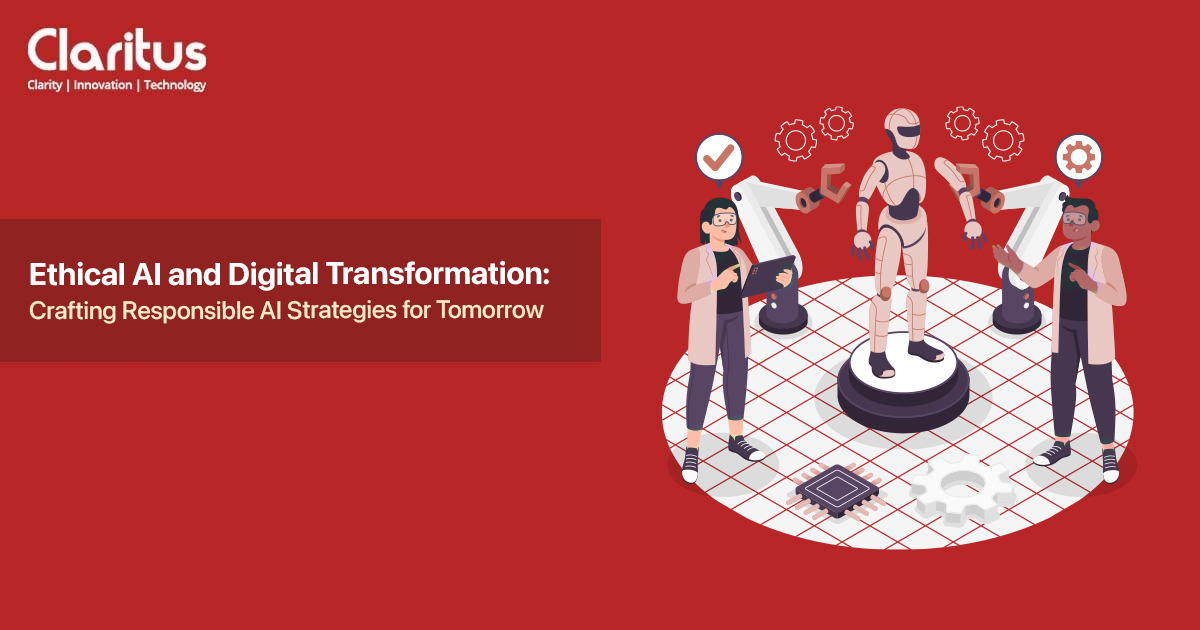Ethical AI and Digital Transformation: Crafting Responsible AI Strategies for Tomorrow

In the ever-evolving landscape of digital transformation, the integration of artificial intelligence (AI) stands as a beacon of innovation. AI technologies have swiftly become the bedrock of numerous industries, revolutionizing processes, enhancing efficiency, and transforming the way we live and work. Yet, amidst this transformative power, there exists a crucial conversation that demands attention: Ethical AI adoption and the imperative of building responsible AI strategies.
Significance of Ethical AI in Digital Transformation
As organizations embark towards embracing digital transformation, the ethical implications of AI deployment cannot be overlooked. The ethical considerations surrounding AI are not merely a matter of compliance; they are a fundamental cornerstone in the quest for responsible innovation.
At the heart of ethical AI lies the commitment to fairness, transparency, accountability, and inclusivity. Integrating ethical considerations into AI strategies is pivotal, ensuring that the deployment of AI technologies aligns with the values and societal expectations of integrity and fairness.
Responsible AI Practices: Shaping Ethical Foundations
Responsible AI practices encompass a spectrum of measures aimed at mitigating biases, promoting transparency, and ensuring ethical decision-making within AI systems. Here are key pillars shaping responsible AI strategies:
Bias Mitigation: Addressing biases inherent in data and algorithms is paramount. Organizations must actively identify, acknowledge, and mitigate biases to ensure fair and unbiased AI outcomes. Implementing diverse and inclusive datasets is a pivotal step toward mitigating biases.
Transparency and Explainability: The ‘black box’ nature of AI models can lead to distrust. Ensuring transparency and explainability in AI decision-making processes allows stakeholders to comprehend and trust AI-driven outcomes, fostering accountability and user confidence.
Data Privacy and Security: Safeguarding user privacy and data security is a non-negotiable aspect of ethical AI. Organizations must uphold stringent data protection measures, respecting user privacy rights and ensuring data is used responsibly and ethically.
Human-Centric Design: Prioritizing human values and well-being in AI development is crucial. Designing AI systems that prioritize human-centric experiences and augment human capabilities rather than replacing them is pivotal in ethical AI adoption.
Navigating the Ethical Landscape in AI Deployments
The ethical journey in AI deployment requires a collaborative effort across multidisciplinary domains. It necessitates an ecosystem where technologists, ethicists, policymakers, and stakeholders collaborate to establish guidelines, frameworks, and standards that foster ethical AI practices.
Ethical considerations in AI deployment extend beyond technical aspects; they encompass philosophical, societal, and legal dimensions. Engaging in open dialogue, continuously evaluating and refining ethical frameworks, and embracing a culture of responsible innovation are foundational steps toward navigating the ethical landscape of AI.
The Future Imperative: Ethical AI for Societal Good
Looking ahead, the role of ethical AI in digital transformation is not just a matter of compliance or ethics; it’s a commitment to harnessing the potential of AI for societal good. Responsible AI practices pave the way for innovations that not only drive business success but also contribute positively to society.
As organizations embark on their digital transformation journeys, integrating ethical AI practices isn’t a choice; it’s a responsibility. It’s about creating a future where AI is not just intelligent but also ethical, where innovation is not just groundbreaking but also responsible and inclusive.
In conclusion, the ethical integration of AI in digital transformation isn’t a destination but a continuous journey—one that requires vigilance, collaboration, and unwavering commitment to ethical principles. It’s about harnessing the transformative power of AI while safeguarding the values that define us as a society.
This blog post endeavours to shed light on the critical importance of ethical AI adoption within the realm of digital transformation, emphasizing the significance of responsible AI practices in shaping a future where innovation and ethics go hand in hand.
